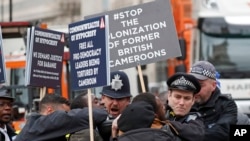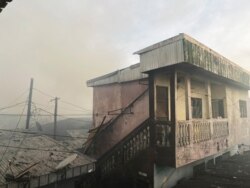It has been nearly 10 months since anyone has heard from Samuel Wazizi, a journalist arrested August 2 and handed over to Cameroon’s military.
“We do not know if Samuel Wazizi is dead or alive,” said Angela Quintal, head of the Africa program for the press freedom group Committee to Protect Journalists.
Wazizi, also known as Samuel Ajekah Abuwe, has been held incommunicado since his arrest in Buea, in Cameroon’s southwest. Authorities have not publicly said why they are detaining him, but police told his lawyer that Wazizi is accused of “collaborating with separatists” and “spreading separatist information,” Quintal said.
The accusations relate to Wazizi’s coverage of the Anglophone separatist movement in Cameroon’s English-speaking northwest and southwest regions. Cameroon’s embassy in Washington did not respond to VOA’s email request for comment.
In the past three years, at least 679,000 people in the region have been displaced by clashes between government forces and armed separatists demanding independence. Security forces are accused of killings, torture and arbitrary arrests, and separatists have carried out killings and abductions, rights groups including Amnesty International and Human Rights Watch say.
The Cameroon government in December granted special status to the regions, but the separatists said they want full independence and boycotted talks to demand the release of political prisoners.
“Journalists in Cameroon are often caught between the government and the separatists and in the process are unable to report freely and fear reprisal,” Quintal said. “The losers are also the public, who have a right to know, and have a right to access information. When you silence a journalist you are denying the public this right.”
Mainimo Etienne Menjo, from The Post, a newspaper in the capital of Yaoundé, underscored her point: “The arrest and intimidation of the media, as far as the Anglophone crisis is concerned, is simply a clear indication that citizens are being denied access to information.”
Journalists face intimidation from both sides in the conflict.
“When you don’t do it the way they want, they start calling you and telling you they know your house in the village, they know your mother, they know your relatives. And that is indirectly telling you they can burn your house, kidnap your mother, kidnap your relatives,” Ndi Eugene Ndi, a freelancer in Yaoundé, told VOA.
“On the other side of it, if you do a report which seems like giving some little credit to the separatists, you can also be sure meeting a commissaire du gouvernement [prosecutor] in a military court,” Ndi said. “It is not easy. You are not safe on both sides.”
The American Bar Association has requested international observer status at Wazizi’s trial and said that authorities have denied the journalist due process.
In a report on his case, the ABA said authorities failed to notify Wazizi of the charges against him, denied him access to his lawyer and family, failed to bring him to court and denied bail because he is held under the country’s antiterror laws.
Wazizi hosted a news program for Chillen Musik & Television and regularly covered the separatist movement, the ABA report said.
Quintal said that when he was first arrested, Wazizi was able to see a friend and begged him “not to let me die in here.” She added that the CPJ had heard unconfirmed reports that the journalist was transferred to State Defense Secretariat in Cameroon’s capital.
Former detainees at the complex told Amnesty last year that guards beat them and forced them to do extreme exercise.
Wazizi’s lawyer, Edward Lyonga Ewule, told VOA the courts have “sealed lips” when it comes to the journalist’s case.
“Let the state of Cameroon produce Samuel Wazizi whether dead or alive, if he is dead let his corpse be handed to his family for a befitting burial, and if he is alive let him be released to his family,” Ewule said.
Quintal said that authorities holding journalists incommunicado is “all too common in Cameroon.”
“We saw this after Ahmed Abba, the Radio France International Hausa correspondent in the north of Cameroon, was detained and held incommunicado,” Quintal said.
Other journalists held in pretrial detention include Wawa Jackson Nfor, who has been in custody for about two years. He is scheduled to be arraigned June 8, Quintal said.
Nfor ran his own news outlet, Wawanews, reporting stories via a Facebook page and text message. He is accused of publishing secessionist information.
Nfor and Wazizi are among eight journalists jailed in Cameroon at the time of CPJ’s 2019 census of journalists imprisoned in retaliation for their work.
Cameroon’s press freedom ranking worsened this year, scoring 134 out of 180 countries, where one is the freest, according to Reporters Without Borders.
Jessica Jerreat contributed to this report.











